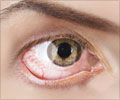Even such a normal activity like rubbing one’s eyes could mean increased pressure, leading to glaucoma.

"The fluid pressure inside the eye increases - or spikes - during many everyday activities," says Adjunct Professor Charles McMonnies, of the University of New South Wales School of Optometry and Vision Science, in a paper published in the journal Optometry and Vision Science.
"Eye rubbing, yoga head stands, weightlifting, sleeping face down, playing instruments like the trumpet and swimming laps are some of the many ways of causing eye pressure spikes," Professor McMonnies says.
Any touching of the eye through the eyelids raises pressure: light touch causes a small increase but firm touch can cause a spike three to five times normal pressure, he says.
Wiping a watery eye and removing eye make-up both increase eye pressure, partly because they involve eye closure combined with lid contact.
In the case of eye rubbing, the combined effects of eye closure and rubbing forces on the eye can raise pressure to very high levels; strong rubbing may raise pressure to 10 times normal levels.
Advertisement
These diseases include glaucoma - which affects a large proportion of elderly people and can lead to blindness - and rapidly increasing myopia, or short-sightedness. Rarer pressure-related conditions include keratoconus, or conical cornea.
Advertisement
Professor McMonnies suggests modifying activities that may be dangerous, such as the following:
Lying down raises pressure and people who are at risk should always try to do their reading while in a sitting position;
Wiping watery tears from the eyes is best done with a tissue held to the corner of the eye and pressed gently against the nose so that lid contact is minimized. The tears can be drained without actually applying force to the eye through the lids;
Avoiding sleeping face down and pillow contact with the eyes is a good idea, but if sleeping on a side is preferred, avoiding any pillow contact on the eye lids is still important. Firmer pillows are easier to position appropriately to avoid eye contact;
If an eye rubbing habit is in response to itchy, dry, irritated eyes, treatment of the cause of the itch, dryness or irritation should be maintained faithfully. Preventing or controlling the itch is important so that the stimulus for rubbing can be avoided;
For some people who have been performing yoga headstands, a switch to any of the many other alternative yoga procedures that do not involve body inversion could be advisable.
The risk of disease progression increases with the size, duration and frequency of the pressure spike. Risk also increases with the number of years during which the activities causing the pressure spikes have been occurring.
Source-Medindia
GPL/L










